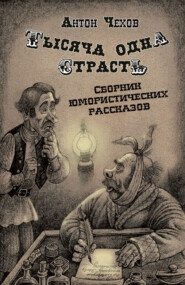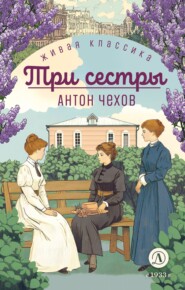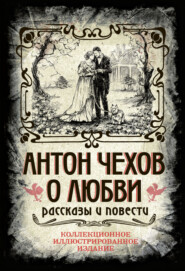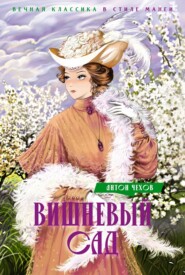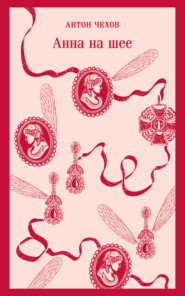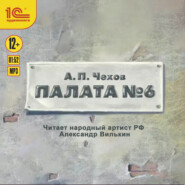По всем вопросам обращайтесь на: info@litportal.ru
(©) 2003-2025.
✖
The Schoolmistress, and Other Stories
Настройки чтения
Размер шрифта
Высота строк
Поля
“It was not heavy before, but now it has suddenly got heavy. No, my lad, the guard has not gone shares with him, I expect. Go and take him something, or he will be jolting us till morning.”
Yasha takes a three-rouble note from the old man and jumps out of the van. The dull thud of his heavy footsteps resounds outside the van and gradually dies away. Stillness… In the next van a bullock utters a prolonged subdued “moo,” as though it were singing.
Yasha comes back. A cold damp wind darts into the van.
“Shut the door, Yasha, and we will go to bed,” says the old man. “Why burn a candle for nothing?”
Yasha moves the heavy door; there is a sound of a whistle, the engine and the train set off.
“It’s cold,” mutters the old man, stretching himself on the cape and laying his head on a bundle. “It is very different at home! It’s warm and clean and soft, and there is room to say your prayers, but here we are worse off than any pigs. It’s four days and nights since I have taken off my boots.”
Yasha, staggering from the jolting of the train, opens the lantern and snuffs out the wick with his wet fingers. The light flares up, hisses like a frying pan and goes out.
“Yes, my lad,” Malahin goes on, as he feels Yasha lie down beside him and the young man’s huge back huddle against his own, “it’s cold. There is a draught from every crack. If your mother or your sister were to sleep here for one night they would be dead by morning. There it is, my lad, you wouldn’t study and go to the high school like your brothers, so you must take the cattle with your father. It’s your own fault, you have only yourself to blame… Your brothers are asleep in their beds now, they are snug under the bedclothes, but you, the careless and lazy one, are in the same box as the cattle… Yes… ”
The old man’s words are inaudible in the noise of the train, but for a long time he goes on muttering, sighing and clearing his throat… The cold air in the railway van grows thicker and more stifling. The pungent odor of fresh dung and smoldering candle makes it so repulsive and acrid that it irritates Yasha’s throat and chest as he falls asleep. He coughs and sneezes, while the old man, being accustomed to it, breathes with his whole chest as though nothing were amiss, and merely clears his throat.
To judge from the swaying of the van and the rattle of the wheels the train is moving rapidly and unevenly. The engine breathes heavily, snorting out of time with the pulsation of the train, and altogether there is a medley of sounds. The bullocks huddle together uneasily and knock their horns against the walls.
When the old man wakes up, the deep blue sky of early morning is peeping in at the cracks and at the little uncovered window. He feels unbearably cold, especially in the back and the feet. The train is standing still; Yasha, sleepy and morose, is busy with the cattle.
The old man wakes up out of humor. Frowning and gloomy, he clears his throat angrily and looks from under his brows at Yasha who, supporting a bullock with his powerful shoulder and slightly lifting it, is trying to disentangle its leg.
“I told you last night that the cords were too long,” mutters the old man; “but no, ‘It’s not too long, Daddy.’ There’s no making you do anything, you will have everything your own way… Blockhead!”
He angrily moves the door open and the light rushes into the van. A passenger train is standing exactly opposite the door, and behind it a red building with a roofed-in platform – a big station with a refreshment bar. The roofs and bridges of the trains, the earth, the sleepers, all are covered with a thin coating of fluffy, freshly fallen snow. In the spaces between the carriages of the passenger train the passengers can be seen moving to and fro, and a red-haired, red-faced gendarme walking up and down; a waiter in a frock-coat and a snow-white shirt-front, looking cold and sleepy, and probably very much dissatisfied with his fate, is running along the platform carrying a glass of tea and two rusks on a tray.
The old man gets up and begins saying his prayers towards the east. Yasha, having finished with the bullock and put down the spade in the corner, stands beside him and says his prayers also. He merely moves his lips and crosses himself; the father prays in a loud whisper and pronounces the end of each prayer aloud and distinctly.
“… And the life of the world to come. Amen,” the old man says aloud, draws in a breath, and at once whispers another prayer, rapping out clearly and firmly at the end: “… and lay calves upon Thy altar!”
After saying his prayers, Yasha hurriedly crosses himself and says: “Five kopecks, please.”
And on being given the five-kopeck piece, he takes a red copper teapot and runs to the station for boiling water. Taking long jumps over the rails and sleepers, leaving huge tracks in the feathery snow, and pouring away yesterday’s tea out of the teapot he runs to the refreshment room and jingles his five-kopeck piece against his teapot. From the van the bar-keeper can be seen pushing away the big teapot and refusing to give half of his samovar for five kopecks, but Yasha turns the tap himself and, spreading wide his elbows so as not to be interfered with fills his teapot with boiling water.
“Damned blackguard!” the bar-keeper shouts after him as he runs back to the railway van.
The scowling face of Malahin grows a little brighter over the tea.
“We know how to eat and drink, but we don’t remember our work. Yesterday we could do nothing all day but eat and drink, and I’ll be bound we forgot to put down what we spent. What a memory! Lord have mercy on us!”
The old man recalls aloud the expenditure of the day before, and writes down in a tattered notebook where and how much he had given to guards, engine-drivers, oilers…
Meanwhile the passenger train has long ago gone off, and an engine runs backwards and forwards on the empty line, apparently without any definite object, but simply enjoying its freedom. The sun has risen and is playing on the snow; bright drops are falling from the station roof and the tops of the vans.
Having finished his tea, the old man lazily saunters from the van to the station. Here in the middle of the first-class waiting-room he sees the familiar figure of the guard standing beside the station-master, a young man with a handsome beard and in a magnificent rough woollen overcoat. The young man, probably new to his position, stands in the same place, gracefully shifting from one foot to the other like a good racehorse, looks from side to side, salutes everyone that passes by, smiles and screws up his eyes… He is red-cheeked, sturdy, and good-humored; his face is full of eagerness, and is as fresh as though he had just fallen from the sky with the feathery snow. Seeing Malahin, the guard sighs guiltily and throws up his hands.
“We can’t go number fourteen,” he says. “We are very much behind time. Another train has gone with that number.”
The station-master rapidly looks through some forms, then turns his beaming blue eyes upon Malahin, and, his face radiant with smiles and freshness, showers questions on him:
“You are Mr. Malahin? You have the cattle? Eight vanloads? What is to be done now? You are late and I let number fourteen go in the night. What are we to do now?”
The young man discreetly takes hold of the fur of Malahin’s coat with two pink fingers and, shifting from one foot to the other, explains affably and convincingly that such and such numbers have gone already, and that such and such are going, and that he is ready to do for Malahin everything in his power. And from his face it is evident that he is ready to do anything to please not only Malahin, but the whole world – he is so happy, so pleased, and so delighted! The old man listens, and though he can make absolutely nothing of the intricate system of numbering the trains, he nods his head approvingly, and he, too, puts two fingers on the soft wool of the rough coat. He enjoys seeing and hearing the polite and genial young man. To show goodwill on his side also, he takes out a ten-rouble note and, after a moment’s thought, adds a couple of rouble notes to it, and gives them to the station-master. The latter takes them, puts his finger to his cap, and gracefully thrusts them into his pocket.
“Well, gentlemen, can’t we arrange it like this?” he says, kindled by a new idea that has flashed on him. “The troop train is late… as you see, it is not here… so why shouldn’t you go as the troop train?[2 - The train destined especially for the transport of troops is called the troop train; when there are no troops it takes goods, and goes more rapidly than ordinary goods train.– Author’s Note.] And I will let the troop train go as twenty-eight. Eh?”
“If you like,” agrees the guard.
“Excellent!” the station-master says, delighted. “In that case there is no need for you to wait here; you can set off at once. I’ll dispatch you immediately. Excellent!”
He salutes Malahin and runs off to his room, reading forms as he goes. The old man is very much pleased by the conversation that has just taken place; he smiles and looks about the room as though looking for something else agreeable.
“We’ll have a drink, though,” he says, taking the guard’s arm.
“It seems a little early for drinking.”
“No, you must let me treat you to a glass in a friendly way.”
They both go to the refreshment bar. After having a drink the guard spends a long time selecting something to eat.
He is a very stout, elderly man, with a puffy and discolored face. His fatness is unpleasant, flabby-looking, and he is sallow as people are who drink too much and sleep irregularly.
“And now we might have a second glass,” says Malahin. “It’s cold now, it’s no sin to drink. Please take some. So I can rely upon you, Mr. Guard, that there will be no hindrance or unpleasantness for the rest of the journey. For you know in moving cattle every hour is precious. To-day meat is one price; and to-morrow, look you, it will be another. If you are a day or two late and don’t get your price, instead of a profit you get home – excuse my saying it – without your breeches. Pray take a little… I rely on you, and as for standing you something or what you like, I shall be pleased to show you my respect at any time.”
After having fed the guard, Malahin goes back to the van.
“I have just got hold of the troop train,” he says to his son. “We shall go quickly. The guard says if we go all the way with that number we shall arrive at eight o’clock to-morrow evening. If one does not bestir oneself, my boy, one gets nothing… That’s so… So you watch and learn…”
After the first bell a man with a face black with soot, in a blouse and filthy frayed trousers hanging very slack, comes to the door of the van. This is the oiler, who had been creeping under the carriages and tapping the wheels with a hammer.
“Are these your vans of cattle?” he asks.
“Yes. Why?”
“Why, because two of the vans are not safe. They can’t go on, they must stay here to be repaired.”
“Oh, come, tell us another! You simply want a drink, to get something out of me… You should have said so.”
“As you please, only it is my duty to report it at once.”
Without indignation or protest, simply, almost mechanically, the old man takes two twenty-kopeck pieces out of his pocket and gives them to the oiler. He takes them very calmly, too, and looking good-naturedly at the old man enters into conversation.
“You are going to sell your cattle, I suppose… It’s good business!”
Malahin sighs and, looking calmly at the oiler’s black face, tells him that trading in cattle used certainly to be profitable, but now it has become a risky and losing business.
“I have a mate here,” the oiler interrupts him. “You merchant gentlemen might make him a little present…”






